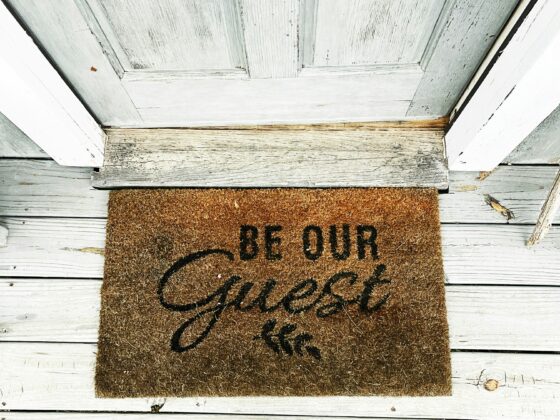
Hospitality, at its core, is about making people feel seen. It’s about creating the kind of moments that cut through the noise of everyday life and lodge themselves in memory forever.
I’ve always believed that service is transactional—you give me this, I give you that—but hospitality is transformational. It’s about taking care of people in ways they didn’t even know they needed. Think about your own travels: you may not always remember the room size or the view, but you’ll never forget the way someone made you feel when they went just a little further than required.
That’s the essence of a guest-centric culture. It’s not built on laminated checklists or robotic greetings, but on human beings who care enough to notice the little things and act on them. Whether it’s a server who remembers your favorite drink, a housekeeper who leaves a note to brighten your day, or a manager who bends down to pick up towels by the pool, these are the small gestures that turn ordinary stays into extraordinary stories. Hospitality, when done right, is not about perfection—it’s about intention. It’s about asking, “What can I do, right now, to make this person’s day better?”
There’s a moment I’ll never forget. I was on a Disney cruise with my son, who at the time was four years old and—like most four-year-olds—a fiercely picky eater. Chicken tenders and fries, nothing else. One afternoon on Disney’s private island, the barbecue buffet was in full swing. My son refused to eat a bite. A server from the ship noticed, quietly excused herself, hopped on a golf cart, rode back to the ship, went up to the pool deck, and returned with a plate of chicken tenders and fries—just so a child wouldn’t go hungry.

That wasn’t service. That was hospitality.
And it’s the difference between a guest saying, “The cruise was nice” and, “I’ll never forget what they did for my family.”
The Meaning of Guest-Centric Culture
When I think of a guest-centric culture, it boils down to three simple questions:
- What impact will this have on the guest?
- Will the guest like it?
- Will the guest remember it?
Providing service is the bare minimum. Every hotel can offer the same bed, the same beach, the same location. Hospitality is what separates you from the hotel next door. It’s not about checklists or scripted greetings—it’s about people creating moments worth remembering.
Guest-centric culture is less about transactions and more about transformations. The true test is whether the guest leaves feeling seen, valued, and cared for—not just accommodated.
The Danger of Overcomplication
Too often, hotels try to engineer service excellence with rigid scripts and sterile training programs. That’s the fastest way to kill authenticity. Instead, leaders need to set clear standards but allow team members the freedom to get creative within the box. Guidelines matter, but personality is what makes service come alive.
Think of it like jazz: the framework is there, but the magic happens in improvisation. Guests know when an interaction is genuine versus rehearsed. A smile forced by a script feels different than one inspired by empathy.
And when employees feel shackled by a script, they’re less likely to show initiative. A guest-centric culture thrives when people feel empowered to surprise and delight.
Consistency vs. Individuality
So how do you balance consistency with individuality? By starting with the guest. Every interaction begins with curiosity: Why are they here? What are they celebrating? What mood are they in? From there, staff can personalize the experience while still meeting brand standards.
The non-negotiables are simple:
- When you clock in, you’re on stage. Personal stress stays behind the curtain.
- Practice empathy. Step into the guest’s shoes.
- Give each other grace. We’re human, and mistakes happen. The goal is progress, not perfection.
These three rules build trust. Guests may not remember every word spoken, but they will remember how they felt.
Culture Is a Daily Rehearsal
Culture isn’t built in one big meeting—it’s forged in repetition. Reading guest surveys at lineups, celebrating wins, discussing feedback openly, and setting the daily drumbeat until it becomes habit.
Leadership visibility is crucial here. When a general manager bends down to pick up towels by the pool or chats with guests in the lobby, it cascades like a waterfall. Behavior trickles down. Staff mirror what they see.
And when the days get tough—when occupancy spikes or staffing thins—positivity is the fuel. A smile from the top, recognition of a job well done, celebrating small victories: those keep the team motivated.
In short, culture isn’t built in a PowerPoint deck. It’s built in the hallways, in the kitchens, at the front desk—one interaction at a time.
Training That Sticks
Forget eight-hour seminars. People check out after 30 minutes. The future of training looks more like TikTok than textbooks: short, visual, funny, and engaging. We already consume our daily information through quick reels and stories—why should hospitality training be any different?
Imagine teaching upselling through a playful skit, or showing empathy through a 60-second video dramatization of a guest complaint. Staff are more likely to retain lessons that mimic the content they naturally consume.
And micro-trainings allow for repetition. A concept reinforced in five minutes daily will outlast a single three-hour seminar that everyone forgets by next week.
Measuring What Matters
Revenue tells part of the story, but culture is better measured through voices—guests and employees alike.
- External voices: Google reviews, TripAdvisor rankings, brand surveys.
- Internal voices: employee opinion surveys, team roundtables, informal feedback.
Both sets of voices matter. A culture cannot be considered “guest-centric” if employees feel disengaged or unsupported. After all, happy employees create happy guests.
And yes, negative feedback gets the same treatment as positive: read it, dissect it, learn from it, and document it. A complaint is not failure—it’s free consulting from the people who matter most.
Hire the Smile, Train the Skill
The truth is, most of service can’t be taught. A system can train someone to check in a guest, but no system can train them to smile sincerely, say “please” and “thank you” instinctively, or take joy in making someone else’s day.
That’s why hiring personality over resume is key. In interviews, I don’t just ask about past jobs—I ask about their favorite restaurants, their favorite stores, why they go back, and whether they’ve researched my hotel. I’m looking for curiosity, awareness, and an instinct for empathy.
Hospitality is a people-first business. If you hire for heart, the skills will follow.
Redefining Luxury
Luxury today isn’t stiff formality. It’s not chocolates on a pillow or white gloves at the door.
For many, luxury is the ability to enjoy quality time with family, sip a well-made cocktail with live music, or dry off with a plush towel after a swim. It’s efficiency—getting your food on time, getting what you want when you want it.
The best service feels seamless, not staged. Luxury is not about excess—it’s about ease.
And that redefinition matters. Too many hotels still cling to outdated signals of luxury. Meanwhile, the modern traveler values connection, efficiency, and comfort far more than pomp and circumstance.
The Challenges Ahead
The greatest challenge to sustaining guest-centric culture isn’t technology or even guest expectations—it’s turnover. A revolving door of staff makes it nearly impossible to nurture a consistent culture.
That’s why budgeting for retention, forecasting for stability, and protecting your workforce are business decisions just as critical as revenue management. Guest experience is only as stable as the team delivering it.
Technology, meanwhile, should be an ally, not a replacement. Automation can handle reports, emails, or even review responses, freeing up staff to focus on the human moments that no machine can replicate. The goal isn’t to replace the handshake, but to give staff the time to extend one.
Training for Tomorrow
Guest expectations are only getting faster. In an age where groceries, streaming, and answers are instant, hotels must train teams to anticipate needs before they’re even voiced. The new standard is not reactive service, but pre-emptive hospitality.
That means designing systems that put the guest at the center: predictive text alerts for early check-in, AI tools that flag repeat guests’ preferences, and training that teaches staff to connect the dots quickly.
Tomorrow’s leaders will be judged not on how well they respond, but on how rarely guests have to ask in the first place.
The North Star of Leadership
For any leader trying to shift their hotel toward a guest-centric culture, the first step is to lead by example. Consistently. Every single day.
From morning lineups to walking the floor, to gently—but firmly—reminding staff about phones, AirPods, and nametags, leadership is a daily performance. Staff can tell when leadership is “on brand” only some of the time. Consistency is credibility.
And if there’s one lesson I’ve learned, it’s this: don’t make decisions based on your preferences. Make them based on your guests’. You’re not running the hotel for yourself—you’re running it for them.
Passing the Torch
One underappreciated aspect of guest-centric culture is mentorship. Senior team members must model and pass on best practices to new hires. When culture is handed down peer-to-peer—not just top-down from leadership—it becomes sticky. A new employee who sees colleagues embodying hospitality learns faster than any handbook can teach.
Creating a culture of mentorship also reduces turnover. When staff feel invested in, they’re more likely to stay—and more likely to invest back in the guest experience.
The Gentle Pressure That Builds Culture
At the end of the day, developing a guest-centric culture isn’t about one grand gesture. It’s about what one of my colleagues recently described as “gentle pressure, relentlessly applied.”
It’s not yelling, it’s not screaming. It’s consistent, steady, and compassionate. It’s asking the right questions, holding the right standards, every single day.
Because culture isn’t built in slogans. It’s built in moments.
And those moments—whether it’s a server bringing chicken tenders to a child, a front desk agent remembering a guest’s anniversary, or a housekeeper leaving a handwritten note—are the ones that turn service into hospitality.
Reprinted from the Hotel Business Review with permission from www.HotelExecutive.com.





